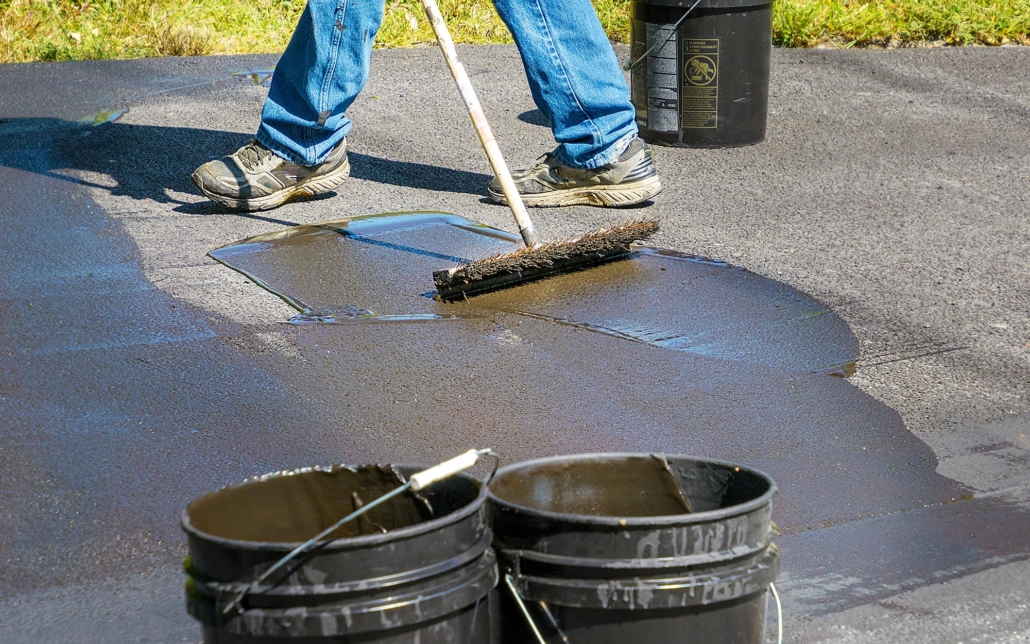Grasping Tilted Parking: How Asphalt Sealing Boosts Commercial Lots
Grasping Tilted Parking: How Asphalt Sealing Boosts Commercial Lots
Blog Article
Hot Mix Asphalt: A Sustainable Remedy for Sidewalk
Hot Mix Asphalt (HMA) has actually arised as a leading sustainable selection for pavement services, supplying a myriad of environmental benefits and innovative technologies. As the need for environmentally friendly building and construction methods grows, exploring the subtleties of HMA's sustainability can provide important understandings into the future of sidewalk remedies.
Environmental Advantages of Warm Mix Asphalt

Additionally, Hot Mix Asphalt aids to minimize urban warm island impacts. Its dark color takes in sunlight, reducing the amount of heat mirrored back into the environment contrasted to lighter-colored pavements. This can lower ambient temperature levels in metropolitan areas, decreasing the demand for a/c and ultimately minimizing energy usage.
In addition, Warm Mix Asphalt contributes to improved stormwater administration. Its permeable nature enables water to reenergize and penetrate the pavement groundwater supplies, lowering runoff and the threat of flooding. These ecological advantages make Hot Mix Asphalt a sustainable choice for leading roadways and highways.
Energy Effectiveness in HMA Production
Is power performance a critical element in the production of Warm Mix Asphalt (HMA)? Definitely. Energy plays a considerable function in the manufacturing of HMA, affecting both cost and ecological sustainability. One key element of power performance in HMA production is using cozy mix asphalt (WMA) innovations (angled parking). WMA permits the mixing and positioning of asphalt at lower temperature levels compared to traditional hot mix asphalt, leading to reduced energy consumption throughout production. This process not just lowers gas use yet also lowers greenhouse gas emissions, making it an extra eco pleasant alternative.
Additionally, improvements in plant technologies have brought about even more energy-efficient HMA manufacturing procedures. Modern plants are created with features like recycled asphalt pavement (RAP) processing capacities, reliable burner systems, and boosted insulation, all adding to power savings. By maximizing energy use in HMA production, the sector can lower its carbon impact while keeping top quality pavement materials. Energy performance is, for that reason, a critical consideration in ensuring the sustainability of Hot Mix Asphalt production.
Recyclability of Warm Mix Asphalt
The recyclability of Hot Mix Asphalt (HMA) is an essential facet of its sustainability and long-term ecological effect. HMA is among the most recycled materials in the United States, with over 100 million lots of redeemed asphalt sidewalk (RAP) being reused every year in new pavement construction. Recycling HMA uses a number of environmental benefits, such as minimizing the demand for virgin materials, lowering power intake throughout production, and reducing the amount of waste sent out to landfills.
The procedure of recycling HMA involves milling the existing pavement, crushing it right into smaller sized pieces, and blending it with brand-new accumulation and asphalt binder to develop a recycled mix. Generally, the recyclability of HMA plays a considerable function in advertising lasting methods within the sidewalk market.

Long-Term Efficiency of HMA
Asphalt sidewalks demonstrate longevity and resilience over an extensive duration, reflecting pop over here the long-term efficiency of Warm Mix Asphalt (HMA) In addition, developments in HMA innovation, such as the usage of polymer-modified binders and cozy mix asphalt, have better boosted the sturdiness and long life of HMA sidewalks. By focusing on top quality construction and maintenance methods, HMA continues to prove itself as a affordable and lasting service for resilient pavement facilities.

HMA: Durability and Sustainability
Showing both sturdiness and sustainability, Hot Mix Asphalt (HMA) has become a cornerstone in the building of resilient sidewalk infrastructures - angled parking. HMA's toughness originates from its capacity to endure hefty lots, harsh climate condition, and high traffic volumes, making it a dependable option for roadways, highways, and airport terminal runways. The make-up of HMA, which commonly consists of aggregates, binder, and filler, plays an important role in improving its durability and resistance to tear and wear
Furthermore, HMA's sustainability lies in its recyclability and energy-efficient production procedure. The capability to recycle recovered asphalt sidewalk (RAP) in new HMA blends reduces the demand for virgin products and minimizes the environmental influence of sidewalk construction and maintenance. In addition, the energy effectiveness of generating HMA lies in its lower blending temperature levels compared to various other pavement products, causing reduced energy intake and greenhouse gas discharges.
Verdict
In verdict, warm mix next page asphalt (HMA) offers a sustainable remedy for pavement with its environmentally pleasant qualities. HMA's recyclability, energy effectiveness in production, and long-lasting durability make it a green selection for roadway building and construction.
HMA is one of the most recycled materials in the United States, with over 100 million heaps of reclaimed asphalt pavement (RAP) being recycled yearly in brand-new sidewalk building and construction.The process of recycling HMA involves grating the existing pavement, crushing it right into smaller items, and mixing it with new accumulation and asphalt binder to produce a recycled mix.Asphalt sidewalks demonstrate toughness and strength over a prolonged period, reflecting the this website lasting efficiency of Hot Mix Asphalt (HMA) Furthermore, advancements in HMA innovation, such as the use of polymer-modified binders and cozy mix asphalt, have better enhanced the sturdiness and durability of HMA sidewalks. The capacity to recycle reclaimed asphalt pavement (RAP) in new HMA mixes reduces the demand for virgin products and minimizes the ecological impact of sidewalk construction and upkeep.
Report this page